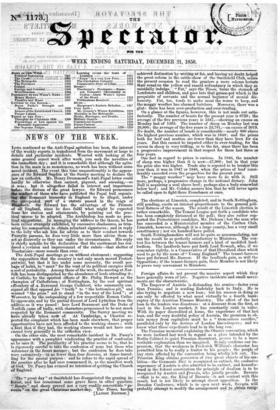NEWS OF THE WEEK.
LONG continued as the Anti-Papal agitation has been, the interest of the weekly reports is transferred from the movement at large to details and particular incidents. Wearied with looking at the same general aspect week after week, you seek the novelties of the immediate day ; and it is remarkable that although the agita- tion in the main is so monotonous, no week has been without some novel incident. The event this time unquestionably is the appear- ance of Sir Edward &leen at the Surrey meeting to declare the law ex cathedra. Mr. Henry Drummond's Anti-Papal letter could hardly be otherwise than earnest, piquant, and amusing,—as it was ; but it altogether failed in interest and importance before the dictum of the great lawyer. Sir Edward pronounces the conduct of those who have published the Papal bull organiz-
ing the R i Romanist hierarchy n England to be illegal, under the unrepealed part of a statute passed in the reign of Elizabeth. Sir Edward has the advantage of the Primate of all England, since he does fulfil what might be expected from his station and attainments, by pointing out the prac- tical course to be adopted. The Archbishop has made no prae- tieal suggestions. In managing the address to the Queen, he has been rather strangely exhibited, by successive 'disclosures, as trim- ming his composition to obtain reluctant signatures ; and in reply to the laity who ask him for advice as to their cmduct towards Puseyite parsons, he does very little more than advise them, to net as discreetly as they can under the circumstances. His reply is chiefly notable for the declaration that the excitement has ren- dered a revision and improvement of the rubric—that shelter of Tractarians—more remote than ever.
The Anti-Papal meetings go on without abatement; suggesting the supposition that the country is not only much moved Protest- antwise, but that it lies under some necessity, the result per- haps of habit, to " meet " for the vent of its political energies with a sort of periodicity. Among those of the week, the meeting at Nor- folk has been distinguished by the abundance of lords attending it ; at Carlisle, by the spirited efforts of Mr. Philip Howard as the champion of Catholicism ; at Nottingham, by the cool spiritual effrontery of a Reverend George Cuthbert, who summarily con-
signed all that opposed "truth" to "the bottomless pit," and warned "the press" not to stand "in the way of the Lord " ' • at Worcester, by the outspeaking of a few respectable Roman Catho- lie opponents, and by the partial dissent of Lord Lyttelton from the address as it was passed : here Lord Beaumont and the Duke of Norfolk came off badly, with characters pronounced to be not much respected by the Romanist community. The Surrey meeting we have already taken note of. At Cambridge a - Chartist re- peated the complaint which has been made elsewhere, that proper opportunities have not been afforded to the working classes ; with a hint that if they had, the working classes would not have con- curred very generally in the orthodox view. On the other side, the most remarkable incident is Dr. Puseys appearance with a pamphlet vindicating the practice of confession as he uses it. The peculiarity of his practice seems to be that he is rigorously careful to take t'he confession of none but those who volunteer in the freest manner ; but the confession he does take very extensively—in no fewer than four dioceses, at times travel- ling for the special purpose : and he refers to the rapid spread of the practice after he had once commenced it, as the manifest work of God. Dr. Pusey has evinced no intention of quitting the Church of England.


























